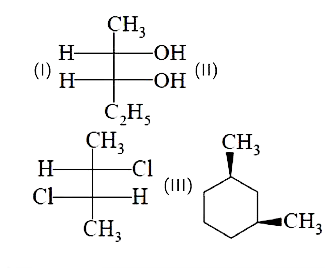Which of the following forms a criterion of purity of organic compound ?
Molecular mass
Empirical mass
Melting or boiling point
Solubility.
The correct Answer is:C
To determine the criterion of purity for an organic compound, we can follow these steps:
1. Understanding Purity: The purity of an organic compound refers to the extent to which it is free from impurities. Impurities can affect the physical properties of the compound.
2. Identifying Criteria: We need to identify which of the given options can serve as a reliable criterion for assessing the purity of an organic compound.
3. Analyzing the Options:
- Option 1: Molecular Mass: While molecular mass is a characteristic of a compound, it does not directly indicate purity. Different compounds can have the same molecular mass.
- Option 2: Empirical Mass: Similar to molecular mass, empirical mass does not provide information about the presence of impurities.
- Option 3: Melting Point or Boiling Point: The melting point and boiling point are significant physical properties that can indicate purity. Pure substances have sharp melting and boiling points, while impurities typically cause these points to broaden or shift.
- Option 4: Solubility: Solubility can vary with temperature and does not provide a definitive measure of purity.
4. Conclusion: Based on the analysis, the most reliable criterion for determining the purity of an organic compound is its melting point or boiling point. Therefore, the correct answer is Option 3: Melting Point or Boiling Point.
Final Answer:
The criterion of purity of an organic compound is best indicated by its melting point or boiling point (Option 3).
---
- Option 1: Molecular Mass: While molecular mass is a characteristic of a compound, it does not directly indicate purity. Different compounds can have the same molecular mass.
- Option 2: Empirical Mass: Similar to molecular mass, empirical mass does not provide information about the presence of impurities.
- Option 3: Melting Point or Boiling Point: The melting point and boiling point are significant physical properties that can indicate purity. Pure substances have sharp melting and boiling points, while impurities typically cause these points to broaden or shift.
- Option 4: Solubility: Solubility can vary with temperature and does not provide a definitive measure of purity.
The criterion of purity of an organic compound is best indicated by its melting point or boiling point (Option 3).
Topper's Solved these Questions
- PURIFICATION & CHARACTERISATION OF ORGANIC COMPOUND BOOK - DINESH PUBLICATIONCHAPTER - PURIFICATION & CHARACTERISATION OF ORGANIC COMPOUND EXERCISE - Assorted .Q
21 Videos
- PURIFICATION & CHARACTERISATION OF ORGANIC COMPOUND BOOK - DINESH PUBLICATIONCHAPTER - PURIFICATION & CHARACTERISATION OF ORGANIC COMPOUND EXERCISE - Revision Q.F.Competitive exams
93 Videos
- PRINCIPLES RELATED TO PRACTICAL CHEMISTRYBOOK - DINESH PUBLICATIONCHAPTER - PRINCIPLES RELATED TO PRACTICAL CHEMISTRYEXERCISE - Brain teasers-42
1 Videos
- REDOX REACTIONSBOOK - DINESH PUBLICATIONCHAPTER - REDOX REACTIONSEXERCISE - Ultimate Preparation
9 Videos
Similar Questions
Knowledge Check
Which of the following is not the criterion of purity of a substance?
AsolubilityBmelting pointCboiling pointDdensityWhich of the following is not the criterion of purity of a substance ?
ASolubilityBMelting pointCBoiling pointDDensityWhich of the following describes the criterion of spontaneity?
AΔS(Total)>0BΔGTP>0CΔHTP>0DNone of above
Which of the following properties is not true regarding organic compounds?
View SolutionAcid hydrolysis of which of the following compounds yields two different organic compounds?
View SolutionWhich of the following compounds are meso forms?

View SolutionWhich of the following is not criterion for essentiality of an element?
View SolutionWhich of the following is not a criterian for classification of living organisms?
View Solution
